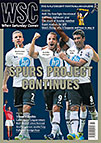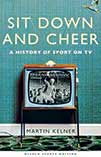Search: ' TV rights'
Stories
In 2008, Superleague Formula was supposed to bring the “passion and pride” of football to the world of motorsport – it didn’t last very long
Last night Iceland’s men beat England to reach the quarter-finals in their first-ever European Championship, yet their women’s team have nearly qualified for their fourth Euros without the same fanfare
28 June ~ When the Icelandic men’s team qualified for Euro 2016, articles were published around the world about it being an unprecedented milestone for a nation of only 330,000. However, this is not the first time Iceland have qualified for a European Championship. In fact, this is the fourth. The national women’s football team have played in the Euros three times – in 1995, 2009 and 2013 – and have almost qualified for Euro 2017. The men’s team are ranked 34th in the world, the women’s team are 20th.
 Jon Spurling remembers how the FA began trialling regular games on the Sabbath in the 1970s despite protests from religious groups
Jon Spurling remembers how the FA began trialling regular games on the Sabbath in the 1970s despite protests from religious groups
Football was facing a crisis at the start of 1974. Attendances in all four divisions had been in decline for a while and floodlit matches were banned as part of the “three day week” introduced by Prime Minister Edward Heath to save on electricity consumption. Sunday football was regarded as one way to inject some life back into the flagging domestic game.
 A history of sport on TV
A history of sport on TV
by Martin Kelner
John Wisden & Co, £18.99
Reviewed by David Harrison
From WSC 311 January 2013
Having worked in broadcasting, I’m painfully aware that those on the inside can be guilty of attaching far too much importance to the social significance of their output. For the viewer, television remains essentially what you do when you get home and remove your shoes. But with average viewing holding steady at around four hours a day, there are so many opinions we’ve all accumulated – consciously or not. Consequently, donning our football hats, every one of us has a view on the relative merits of commentators, presenters, pundits and the like.
Martin Kelner has tapped into the great national pastimes of sport and TV with this extensively researched work. It covers the developing relationship between the two, from the early days – characterised primarily by suspicion and resentment – through to today when everything has changed, apart from the suspicion and resentment.
The opening chapters are fairly dull, accurately reflecting TV coverage of sport for most of the last century. Things don’t really get going, in real life or the book, until the FA Cup’s “Matthews Final” in 1953 when the first rights payment was made for coverage of a live sporting event. Kelner observes that this represented the first occurrence of footballers overtaking their cricketing counterparts in terms of public awareness. So many pioneering figures, on both sides of the camera, have helped drive televised sport to the intrusive position it holds today and Kelner is happy to acknowledge and credit, generally without attempting to compare – apart from the BBC incarnation of Des, his absolute favourite.
Age will determine where the reader’s affections and admirations lie, but they’re all here – from a football perspective commentators such as Captain Henry Blythe Thornhill “Teddy” Wakelam, who delivered Britain’s first live sports broadcasts in 1927, through massive figures like Raymond Glendenning, Peter Dimmock, Kenneth Wolstenholme, David Coleman, Brian Moore and beyond. Pundits, effectively a 1970 World Cup innovation, are acknowledged and discussed, as are the off-screen visionaries who made it happen – men like the heroic Dimmock, Angus Mackay, Paul Fox, Bryan Cowgill, John Bromley and many others. And then there’s Jimmy Hill, a man who could justifiably claim a place in all three groups.
The book is characterised by Kelner’s gags; many dismal, for which he consistently and wisely blames others, but some very funny. The factual stories also contribute greatly. In the weeks before the consummate Coleman took over as presenter of Grandstand, I particularly liked the account of Dimmock’s own attempts to read results from the teleprinter. Not a football man, Dimmock was confronted with “Cltc 3 Ptk Th 1” which, in the absence of any assistance through his earpiece, he delivered as “Celtic 3 Purr Thaaa 1”. Kelner wears his lack of actual match attendance as a badge of honour and the device works well. If this book appears under your Christmas tree, you may well finish it before the turkey sandwiches appear.